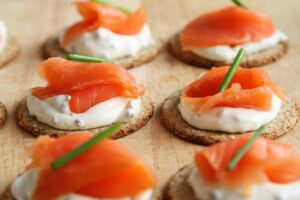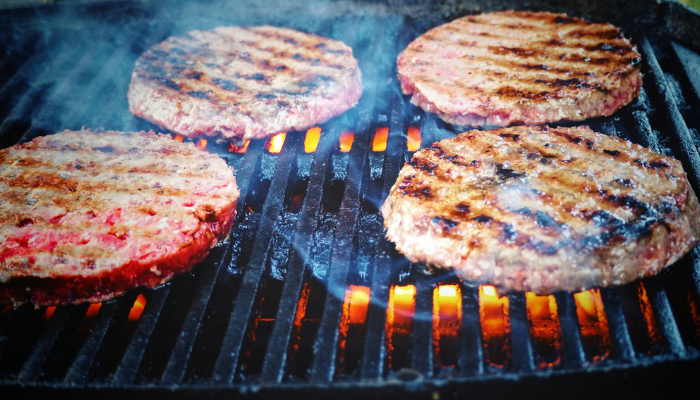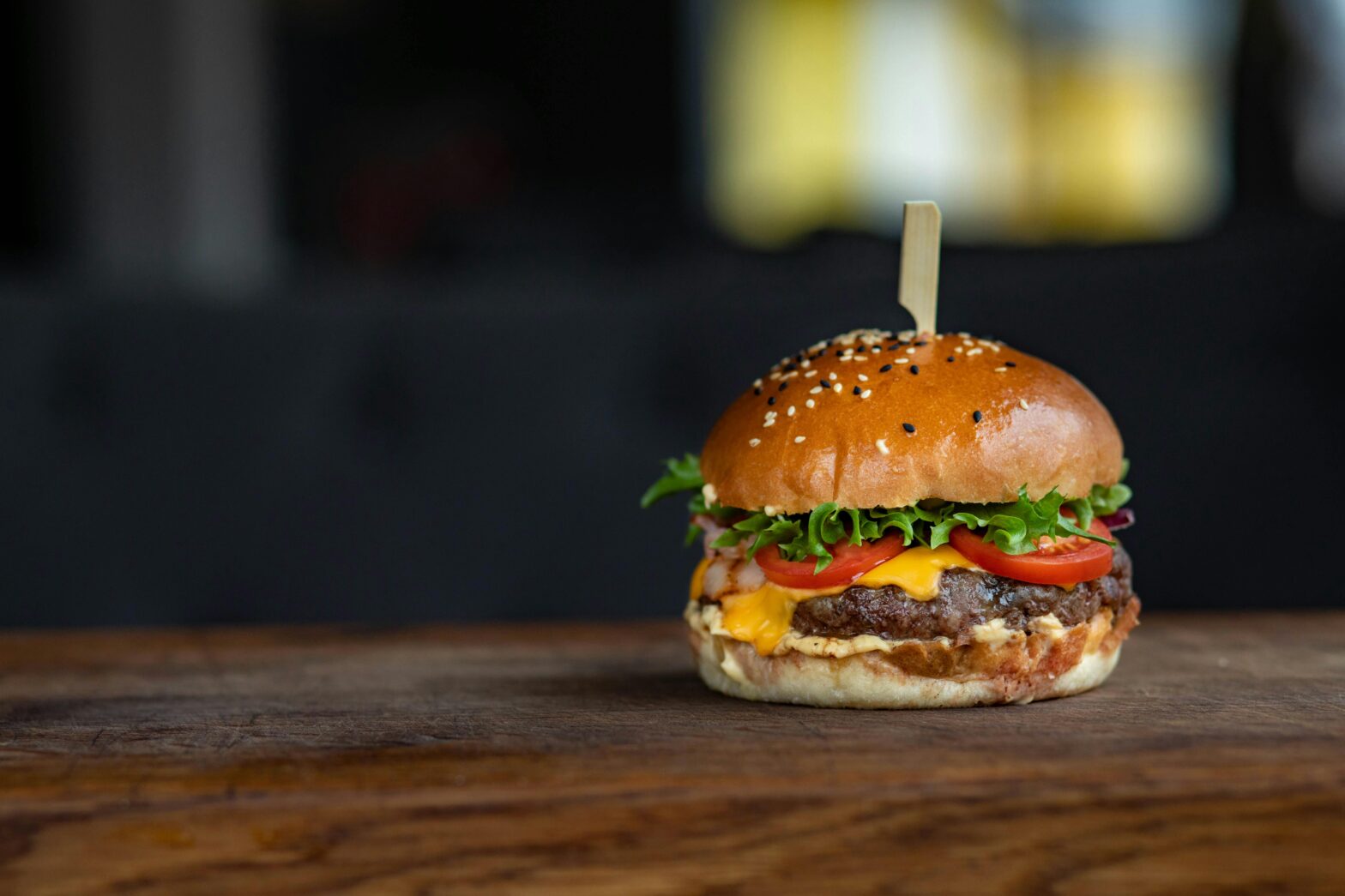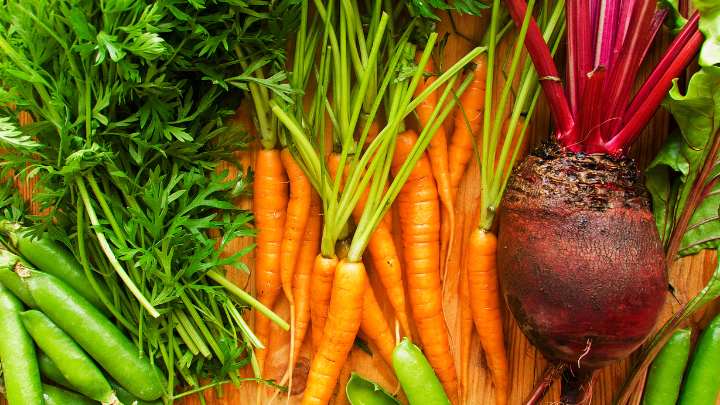Lately, plant-based diets have gained recent popularity not only for their health benefits, but also for their lower environmental impact compared with an omnivorous diet.
The most significant global health crises affecting our generation are non-communicable diseases and climate change, which are both inextricably linked to diet.
Ask anyone who wants to stay away from diseases, but also if they want to save or destroy the planet, and the answer is pretty obvious.
So how can you achieve both at the same time? Let’s see what a Stanford Medicine-led trial has to say.
Fun-fact, the new Netflix documentary You Are What You Eat: A Twin Experiment, based on the study, is streaming right now. Here’s our summary!
In this article
Free guide to reverse your biological age

- Master the science of rejuvenation.
- Apply proven tips to turn back the clock.
- Transform your health with top longevity specialists.
Everybody knows that the average American diet is unhealthy. That’s why it’s sometimes also known as the Standard American Diet, or S-A-D for sad.
For several years now, a plant-based diet has been taking the throne in limiting age-related diseases and improving health. Vegan diets per se have been linked to improved heart health and decreased risk of cardiovascular diseases, due to a higher consumption of vegetables, legumes, fruits, whole grains, nuts, and seeds.
Are they just a trend or a real deal?
The Twin Experiment

The Stanford study was based on 22 pairs of identical twins from May to July 2022 (for eight weeks only).
Since everyone responds uniquely to the same food, the scientists and researchers decided to test on identical twins for an ideal experiment. The chosen twins also grew up in the same households and reported similar lifestyles.
Each identical twin has identical genes in every cell of its body. Thus, this nutritional study would be perfect to differentiate between nature v.s. Nurture.
With advances in new technology and methodology, you can now investigate metabolism in a very comprehensive way. This can help us understand the effects the foods we eat have on us!

The aim of the study is to investigate the impact of two different diets for cardiovascular health, metabolic status, and the gut microbiome.
An important point of the study is the fact that, for, the omnivores were also given and advised healthy diets. The researchers created a good, healthy omnivore diet to keep a fair comparison. Diet A v.s Diet B.
The procedure
One twin was put on a vegan, or plant-based, diet (free of meat, seafood, eggs, and dairy), while the other ate an omnivore diet (including plants, meat, and animal products).
- For the first 4 weeks, the team delivered foods to the twins, and they can only eat that. 21 meals per week– 7 breakfasts, lunches, and dinners.
- For the last 4 weeks, the twins are prepared their own meals.
A registered dietitian, or “diet whisperer,” was on call to offer suggestions and answer questions regarding the diets during the duration of the study. The participants were interviewed about their dietary intake and kept a log of the food they ate.
For a comprehensive approach to this study, scientists looked at body composition, the epigenome, or biological clock, the microbiome, and the brain of the twins, before and after the experiment.
Besides their diet, a professional bodybuilder and health coach was also hired. He specialises in helping people build muscle and lose fat on a plant-based diet. The twins were given a set of exercises that they had to maintain throughout the course of the study.
The issue with our system
Everybody knows that they should eat more fruits and vegetables. Our dietary guidelines say it, the commercial breaks on TV also say it. But what if people simply do not have access to fruits and vegetables?
This Standard American Diet, in fact, grew out of the post-World War II mentality that more calories (especially at lower prices) was the way to be nourished and strong.
Recent years observed the drastic growth of the agricultural farming sector, as well as the rise of factory farming and ultra-processed food. Just like 200 years ago, the only way you could make a wheeled vehicle move was to hook a horse up to it. Similarly, the food industry has turned into a profit-making business that is causing damage to both our health and the health of the planet.
There are around 1.7 billion cows on Earth right now that are being raised for food. If you weighed those cows and compared them to the total mass of every mammal, bird, reptile, and amphibian living on land, the cows outweigh them by more than a factor of ten.
A large amount of global emissions of greenhouse gases come from the whole global agricultural sector. Most of that comes from emissions from cattle. Cattle have a rumen system that causes them to burp and fart methane. And methane is a greenhouse gas that is much worse than carbon dioxide.
There’s an obligation for all people on the planet. We have to reduce the consumption of meat. And if the planetary reasons do not suffice, let’s see how switching to a vegan diet for 8 weeks already results in a better shape and mind.
What was measured in The Twin Experiment?
Before starting the actual training program, the twins’ initial conditions were measured. Aside from measuring their weight, they also examined their insides.
1. DEXA scan
A DEXA scan was taken in order to distinguish how much muscle mass, body fat, and visceral body fat they had. It’s an accurate method to measure how much muscle mass each twin will be able to put on and how much fat they will be losing over the course of 8 weeks.
If you don’t have muscles, you are unhealthy. Regardless of your pant size or scale weight.’’
Amy Kutch Stanbery, Co-Founder of DexaFit.
The Dexa machine, a short for Dual- Energy X-ray Absorptiometry, is a state-of-the-art device originally designed for measuring bone density. The machine operates by emitting two distinct X-ray beams with different low energy levels.
These beams pass through your body and are absorbed by various tissues at different rates. By measuring the amount of X-ray that passes through your body, the machine can create detailed images and provide precise data about your bone density, fat distribution, and lean muscle mass.

Scientists nowadays are agreeing on how BMI, or Body Mass Index, which only looks at height and weight– does not provide any actual health status. For instance, a bodybuilder standing 183 cm tall and weighing approximately 113.4 kg with 10% body fat would be classified as obese based on BMI calculations. In contrast, a female weighing 54.4 kg, regardless of her height, with nearly 40% body fat would be considered within the normal range. This is purely wrong.
The DEXA scan allows to measure your lean muscle mass– the type of mass you want to increase, as well as your visceral fat– the type you’d want to decrease.
Visceral fat is a dangerous type of fat that lies around your organs, increasing your risks of type 2 diabetes and metabolic syndrome. Animal products and processed foods contain high amounts of trans and saturated fats. Consuming lots of those will increase your chances of storing visceral fats around your organs.
2. Blood tests
The twins then measured their cholesterol, insulin, and glucose levels prior to the study. These are good indicators of heart health. Imbalances in their levels often lead to heart diseases. For instance, high cholesterol increases atherosclerosis risk, insulin resistance can signal type 2 diabetes, and abnormal glucose levels may indicate prediabetes or diabetes, both of which elevate cardiovascular disease risk.
Their inflammation markers were also to be determined, which is related to their immune system. Chronic inflammation is now considered one of the 12 hallmarks of ageing. It has been shown to trigger reactions that can lead to cellular damage, promoting diseases such as arthritis, heart disease, and Alzheimer’s, highlighting its role as a significant ageing and health determinant.
3. Epigenetic tests and biological age
It is epigenetics that has led scientists to realise that your DNA isn’t what determines your fate, but rather you who decide the fate of your DNA. Your genome is a fixed set of instructions, but your epigenome controls how your genome is read. Unlike genetics, your epigenetics is flexible, and it highly depends on your lifestyle and environment. In fact, nutrition is one of the most critical determinants of epigenetics, and even your biological age.
While your chronological age is the amount of time you have circled around the sun, your biological age reflects the state of your cellular environment. It’s a more accurate reflection of your actual health status, compared to the number found on your passport. Your biological age can now be measured through epigenetic tests.
4. Microbiome tests
Besides pee and blood, the researchers also collected poop sample to measure the state of the microbiome of the twins before and after the experiment. Your gut microbiome is a collective community of microorganisms living inside your gut, primarily your large intestine.
It’s a complex ecosystem within you, teeming with trillions of bacteria, both good and bad. The balance of these microbes is crucial; it influences everything from your mood to your immune system.
For instance, when you don’t take care of your microbiome, you start secreting mucus. This mucus, consisting of carbohydrates, is present as a barrier to keep your gut microbes separate from your intestinal cells.
When there are not enough plant-based carbs for your gut microbes to consume, they start consuming the mucus lining. In a nutshell, your microbes start eating you. Gastrointestinal problems is only the beginning.
Discover 20 foods you eat to improve your gut health!
5. Genital temperature
This initial insight sheds light on the significant impact diet has within this framework. The genital blood vessels, less than a millimetre in size, serve as an early warning system, similar to the canary in the coal mine. Although this study focuses solely on genital temperature variations, it provides a broader view of the twins’ vascular health. Temperature fluctuations are directly linked to blood flow changes, potentially indicating vascular issues like high cholesterol, hypertension, and diabetes. Basically, their arousal levels will be measured and compared before and after the experiment.
The results
Once again, blood, poop, and pee were collected to find out exactly what happened after doing this experiment for eight weeks. The results surprised even the Stanford research team.

The study found that, after 8 weeks only, the twins eating the plant-based diet experienced: an increase in their life expectancy; reduced visceral fat (the dangerous fat that accumulates around your organs); reduced risk of heart disease; and even a heightened sexual drive.
Here’s all you need to know:
- One twin based on the vegan diet displayed more arousal than the other.
- Omnivores’ LDL cholesterol levels remained unchanged on average, whereas those on a plant-based diet experienced an average drop of 10%. LDL cholesterol is known as the ‘’bad cholesterol’’.
- The vegan participants showed about a 20% drop in fasting insulin.
- The vegans also lost an average of 4.2 more pounds than the omnivores.
- TMAO (trimethylamine oxide) levels, associated with increased inflammation and heart disease risk, rose with meat consumption but significantly decreased on a vegan diet.
- Bifidobacterium, a beneficial gut bacterium helping in infection prevention and involved in vitamin production, increased in the vegan group but remained stable in omnivores.
- Last, but not least, a significant reduction in biological age within eight weeks across all the twins on a vegan diet, was observed.
The study explored ageing through biological markers, including telomere length and an epigenetic clock, with telomeres serving as DNA protective caps that shorten with age.
Initially, there was no statistical difference in telomere length between twins, but by the study’s end, those on a vegan diet had longer telomeres than their omnivore counterparts, suggesting a reduction in biological age.
Telomeres are the protective caps on the ends of strands of your DNA. The length of telomeres actually decreases as we age. If your telomeres stay longer, you’re actually in better health and have a younger biological age relative to your chronological age.
By the end, within the omnivore group, there was no difference in the length of one person’s telomeres from the beginning to the end of the study. But the vegan group had telomeres that were longer than the twin on the omnivore diet.
These epigenetic clock data suggest that eating a vegan diet can slow or even reverse cellular ageing.
Dr. Gardner.
The issue with vegan diets
A vegan dietary pattern is typically lower in energy density but higher in fibre, vitamins, minerals, and phytonutrients. However, sometimes a vegan dietary pattern can limit specific nutrients, such as vitamin B12, iron, and calcium. A poorly formulated vegan diet can include low-quality plant foods, such as refined carbohydrates and added sugars.
It is important to make sure you eat way more if you’re moving to a vegan diet. Eating more, supplementing, and exercising will help you gain lean muscle mass.
Conclusion from the Twin Experiment from Standford

This was the first time such an experiment was being conducted, and it indeed shocked the researchers themselves. Dr. Gardner, profesor in the Standford Precention Research Center highlights how such a generalisable diet can be easily accessible to anyone.
“This suggests that anyone who chooses a vegan diet can improve their long-term health in two months, with the most change seen in the first month.”
The results are clear. Most of us would benefit from switching to a more plant-based diet, which has been shown to improve longevity. The most important part rather than strictly going vegan is to include more plant-based foods into your diet. But also cut back on saturated fats.
Dr. Gardner has been “mostly vegan” for the last 40 years. “Luckily, having fun with vegan multicultural foods like Indian masala, Asian stir-fry and African lentil-based dishes can be a great first step.”
Link to the science study.
















